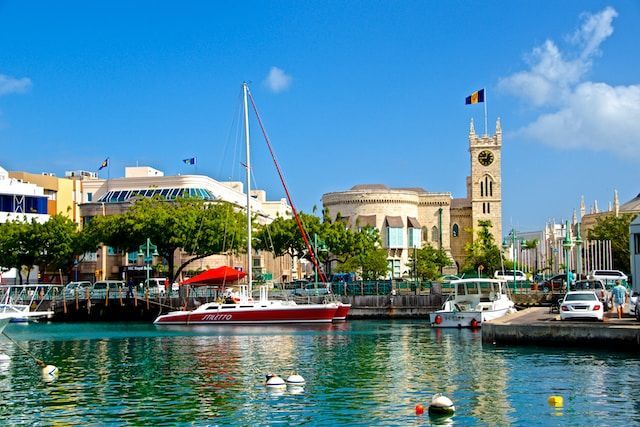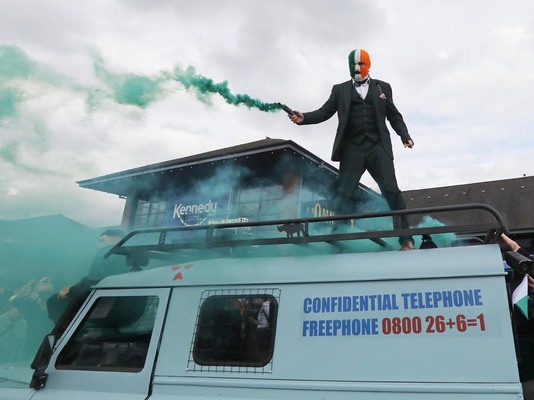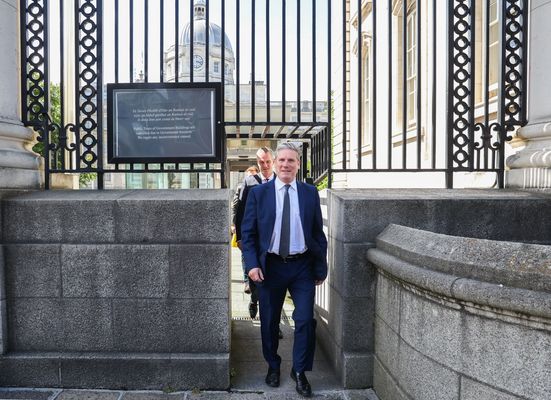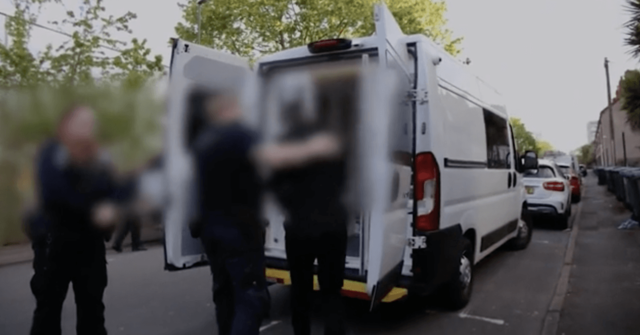Barbados is a small place, but one which captures the decline of British influence, the rejection of monarchy and the need for a reckoning with the past. It is also a place connected to Ireland and not in a good way. Before and after Cromwell’s barbaric siege of Drogheda (1649), the Irish started to arrive in Barbados, some as adventurers, others as indentured (contracted) servants and still others as convicts and prisoners of war.
To begin with, the British colonisation of Barbados depended on indentured labour to grow cotton and tobacco. But then came the sugar rush. Labour intensive to grow, harvest and process, sugar cane was the cornerstone of colonial exploitation of the Caribbean. Slaves were imported from Africa to work the sugar plantations and sugar was exported to Europe where other goods were produced to export to Africa where more slaves were bought, and so on. Over a twenty year period, the population of Barbados expanded by nine times and by 1660, more than half the population was made up of 27,000 African slaves.
A year after becoming a republic, Barbados is planning to make British MP Richard Drax pay reparations for his family's slavery legacy. The Drax family, owned the first sugar plantation in Barbados and Jamaica, and pioneered the use of African slaves. pic.twitter.com/p2QADvyP0H
— African History & Culture | Talkafricana.com (@talkafricana) November 27, 2022
Irish political and social “undesirables” were exported to such colonies in varying numbers over two centuries. Having slaughtered most of Drogheda’s defenders, Cromwell dispatched those he spared to Barbados, without a second thought. Nine years later, Cromwell was dead and a couple of years after that, Charles II was restored to the throne.
Barbados is finding ways to tackle the injustices of the past. Pic courtesy of unsplash.com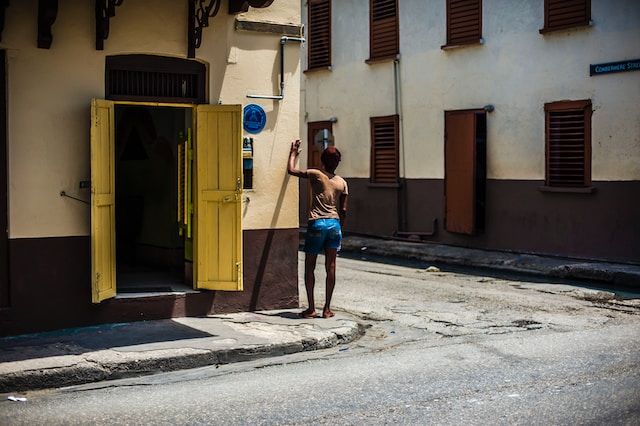
Barbados gained its independence in 1966. Two years ago it became a republic and is currently in the process of developing a new constitution. So here we are, some 360 years after colonisation, and Barbados is finally achieving self-determination as a republic, and is in the thick of finding ways to tackle the injustices of the past. “Reparatory justice” is part of the conversation.
Barbados won’t be toasting Charles’s coronation – we’re still celebrating being rid of the monarchy | Suleiman Bulbulia https://t.co/TAXXc72UUy
— Guardian Opinion (@guardianopinion) May 6, 2023
It looks like Jamaica may be next. It is one of twelve countries that have signed a letter to Charles III asking for an immediate commitment to discussions about reparations for “the oppression of our peoples, plundering of our resources, denigration of our culture and to redistribute the wealth that underpins the crown back to the peoples from whom it was stolen”. Charles has inherited a personal fortune of £1.8 billion which, under a deal between the late Queen and John Major’s Conservative government in 1993, is exempt from inheritance tax.
Part of this fortune is linked to the slave trade. Documentary evidence shows that direct ancestors of Charles III were buying slaves from the Royal Africa Company in the 1680s. Bristol slave trader Edward Colston, whose statue was toppled in June 2020, was the Royal Africa Company’s deputy governor. In 1689 Colston transferred £1,000 (£205,000 in today’s money) of shares in the company to – yes, you guessed it – King William III, a.k.a. William of Orange, a.k.a. King Billy. The researcher who discovered this, Dr Brooke Newman, said: “There is no doubt that the centuries of investment in African slavery, and the slave trade, contributed hugely to building the status, prestige and fortune of today’s royal family.”
You missed out colonialism, imperial theft & slavery. You’re welcome. 😎 https://t.co/AB9rwQZrTf
— Paul Patrick (@PaulTyredagh81) May 8, 2023
According to a recent book, the idea that Britain led the world in the abolition of slavery is a well-crafted myth. Ballymena-born historian Michael Taylor shows that key interest groups fought to resist the impact of the 1807 Slave Trade Act (which was designed to outlaw the trade in “stolen” slaves but not slavery as such) and to undermine efforts to make the ownership of slaves illegal. Radical abolitionists such as Elizabeth Heyrick became increasingly angry at the slow pace of reform, organising a boycott of sugar in 1824. When the 1833 Abolition Act was finally passed, many slaves were not freed and it was the slave owners who were compensated, for losing their “property” – at a total cost of £340 billion in today’s money. The British government took out loans at the time to finance the compensation, a debt that was only paid off as recently as 2015.
In today's video @RHULHistory students Francesca Hillier, Olivia Kew and Hannah Foster examine the sugar boycott, part of the extra-parliamentary campaign to abolish slavery. #historyteacher https://t.co/gBIdscyF0G pic.twitter.com/hAKk6PR21K
— History Hub (@HistoryHubRHUL) October 4, 2019
Taylor’s book (The Interest: How the British Establishment Resisted the Abolition of Slavery) is a tough read, especially the accounts of rape, torture, mutilation and death in Demerara and elsewhere. But it is also an account of immense courage and struggle as slaves with next to no resources organised themselves and rebelled.
207 years ago today, 14-16 Apr 1816, Bussa led the largest revolt of enslaved #Africans in #Barbadian history; first of three rebellions in British West Indies, with 1823 Demerara, 1831-32 #Jamaica, that shook public support for slavery in the years leading up to Abolition. pic.twitter.com/8pRJ4B1kRC
— Wayne Chen (@wcchen) April 14, 2023
Charles has now committed to “research” on the issue, though the details are vague at this point. Others have taken a more proactive stand. The Trevelyan family owned slaves in Grenada and received the equivalent of £3 million in compensation. Members of the family, including BBC reporter Laura Trevelyan, went to Grenada in February to give a formal apology to the people of Grenada.
What matters most in all this is how unfolding historical evidence and awareness plays into contemporary politics, institutional policies and individual behaviours. Going back to the reparations for slavery debate, it is clear that this is adding momentum to Commonwealth countries becoming republics.
This was on the advice of a member of the Caribbean Community’s Reparations Commission. The family has donated £100,000 to education projects which some Grenadians think is too little. Some demand investment in health as evidence mounts of the link between very high rates of diabetes in the Caribbean today and generations of slaves fed on sugar cane in the past.
Laura Trevelyan left the BBC in March and now devotes her time to campaigning for reparatory justice. In a recent interview with BBCNI’s Mark Simpson, she discussed the family’s involvement with slavery and also the role of another family member – Sir Charles Trevelyan – who was the Assistant Secretary at the Treasury with responsibility for famine relief in Ireland in the 1840s. Laura is Sir Charles’ great, great, great granddaughter.
Laura was one of the BBC journalists covering the talks that led to the Good Friday Agreement. She says, “I well remember Martin McGuinness saying to me, ‘is this a coincidence that the British have sent a Trevelyan for the BBC, a state institution, to cover these negotiations?’”. She then says that she didn’t really understand what he was talking about. Some years later she had caught up. In 2006 she published a book about the Trevelyan family (A Very British Family: The Trevelyans and their World) in which she discusses the role of Sir Charles in An Gorta Mór.
She is now of the view that, should the Dublin government say that her family has a responsibility for what Sir Charles did and didn’t do as part of the British administration of the day, then “that would have to be considered”. She argues that, in terms of where moral responsibility lies, there is a difference between private individuals profiting from slavery and a civil servant acting on behalf of the British government. RTÉ’s Claire Byrne provides a good summary of this discussion.
What matters most in all this is how unfolding historical evidence and awareness plays into contemporary politics, institutional policies and individual behaviours. Going back to the reparations for slavery debate, it is clear that this is adding momentum to Commonwealth countries becoming republics.
This may alter the character of the Commonwealth itself or even lead to its collapse for want of a purpose when compared to other multinational bodies. This in turn is relevant to the discussion of whether a new united Ireland should join the Commonwealth. Justice Richard Humphreys argues that it should, as this would have strong symbolic value to those in Ireland with a British identity. Even if Charles was no longer to head it up?
Professor of British and Commonwealth History, Philip Murphy, says the Commonwealth has run its course and is a ghost of its former self. While it talks about “the importance of promoting democracy, tackling climate change, tackling gender inequality, the Commonwealth isn't necessarily a logical framework internationally in which to deal with any of those problems”.
Meanwhile (sarcasm alert), there’s always the lively, reflective debate within the Orange Order on King Billy’s role in the slave trade to look forward to.

